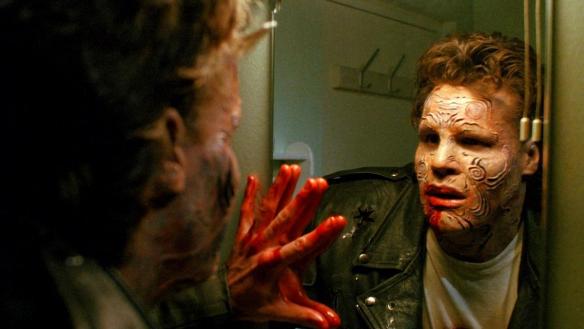Hello folks, and welcome back to Wrong Every Time. We’re truly nearing the end of the year at this point, which means it’s getting to that time when I must actually examine the animated year in retrospect, and catch up on any key productions I might have missed. Uzumaki fell apart and Dandadan’s second episode still failed to grab me, but there’s still plenty else I need to check on, from the Dead Dead Demons adaptation to the latest installments in the Monogatari and Sound! Euphonium franchises. Between those, Delicious in Dungeon, and the year’s superb film crop (Naoko Yamada and Kiyotaka Oshiyama!), this is looking to be an altogether laudable year in anime, before we even get to backlog personal projects like Sailor Moon. I’ll be starting on all that shortly, but in the meantime, I have of course continued sampling whatever films either catch my fancy or rudely invade my screen via my roommate’s craft-neutral curiosity. Let’s break ‘em down!
First up this week was Nightbreed, a film written and directed by Clive Barker, based on his own novella Cabal. That’s about as full of a Barker experience you could ask for, and the resulting film exemplifies his thoughtful, idiosyncratic approach to dark fantasy horror. Craig Sheffer stars as Aaron Boone, a man who is falsely accused of being a serial killer, and who finds community among the so-called monsters of the “Nightbreed.” These creatures generally keep to themselves within their subterranean sanctuary; however, when the fearful surface dwellers discover them, Boone and his companions will have to fight for survival.
As anyone familiar with Barker’s work well knows, his monsters are rarely implacable, unknowable ghouls – they are a reflection of how easily that which is unfamiliar can be framed as monstrous, as illustrated through vehicles like the lynching that inspires Candyman’s vengeful quest. So it goes for the Nightbreed, a collection of lovingly costumed castaways who serves as this film’s true star, richly furnishing the corners of Boone’s walk on the wild side.
While Boone and his girlfriend Lori (Anne Bobby) come to know the people of the underground, they are pursued by the actual serial killer, played with aplomb by horror maestro David Cronenberg himself. The clashes between Cronenberg, the police, and the desperate Nightbreed offer a thrilling final act to a film that’s generous in both lurid set design and thematic texture, a clear metaphor for queer liberation that also more than succeeds as pure, generous spectacle. Barker is one of the most distinctive, essential voices in modern horror, with his compassionate and ever-curious perspective consistently delving the intersection of fear and identity. Nightbreed offers a fine demonstration of his magic at work.
Next up was Non-Stop, starring Liam Neeson as a Federal Air Marshal who receives a message that the plane he is on has been secretly hijacked, and that one person aboard will be killed every twenty minutes until a ransom is paid. With no clue as to the culprit and enemies seemingly on all sides, Neeson will have to race to discover the killer while maintaining order on the flight, all while both his superiors and fellow passengers suspect he himself is the hijacker.
Non-Stop is one of a seemingly endless series of late-career thrillers and quasi-action movies from Neeson, seemingly designed to fill the gap left by the demise of films like The Fugitive or Clear and Present Danger. Look, dads need thrillers too, and frankly Non-Stop surprised me with its dramatic ingenuity, managing to keep tension high and stakes diverse in spite of its inherent locked-room premise.
The result falls halfway between Murder on the Orient Express and Speed, balancing interrogations, ploys designed to reveal collaborators, and direct physical struggles between Neeson and his increasingly distrustful fellow passengers. The whole works only because the film cares about character; it builds up the personalities and perspectives of the key passengers with laudable efficiency, making it easy to invest in picking favorites or suspects as the drama unspools. Couple all that with The Shallows’ director’s knack for temporally constrained drama, and you end up with an unassuming but altogether effective thriller.
We then checked out The Tank, a recent horror film starring Luciane Buchanan and Matt Whelan as Jules and Ben, a young couple who come into an unexpected windfall when Ben discovers his family owns a remote cabin on the coast of Oregon. Arriving at the site with their daughter, the two find the place haunted by strange noises and unnerving secrets, all stemming from the vast water tank adjoining the property. Things escalate swiftly from there, as the couple discover the true story behind the death of Ben’s family just in time for history to repeat itself.
The Tank is a humble horror feature that wears its influences proudly on its sleeve, combining a dash of Amityville spook-ems with a pinch of The Descent’s claustrophobia, alongside a final act that’s more or less directly transposed from Aliens. Stealing is no crime so long as you steal well, and The Tank makes fine use of its influences, with its best sequences embracing the vulnerability and alienating lighting design opportunities afforded by its titular water tank.
Unfortunately, its concept and cast are stretched a touch too thinly across its running time; the first act meanders without payoff for far too long, and the relationship between its leads lacks the texture to carry the sequences not driven by bumps in the night. A better version of this film, one which utilized the ethereal mystery of Ben’s family to touch on some more Picnic at Hanging Rock-style cosmic horror, would have furnished The Tank with the hooks necessary to build up its eventual creature feature turn. As-is, the film is unfortunately less than the sum of its parts; some nice gestures towards the alienation of young motherhood in the coastal backwoods, some fun faceoffs between survivors and monsters, but no unifying force to draw it all together.
Last up for the week was Spriggan, a ‘98 anime action film centered on a young super-soldier named Yu Ominae. In the waning years of the cold war, the misuse of mysterious ancient artifacts is prevented solely by the ARCAM Corporation, who are dedicated to unlocking the secrets of these strange relics. Yu works for ARCAM as a Spriggan, a biologically enhanced warrior equipped with the finest in weapons and technology. Of course, those rascally Americans are always looking for a new superweapon, and thus Yu will be tested to his limits in a battle for the future of mankind.
Spriggan’s story is basically half Metal Gear Solid, half Indiana Jones, with neither the political depth of the first nor the easy charm of the second. What it does possess is some gorgeous art design and animation, courtesy of a Studio 4°C production team including Katsuhiro Otomo on production/composition, Stink Bomb AD Hirotsugu Kawasaki directing, and preposterous talents including Shinji Hashimoto and Akio Watanabe providing key animation. With one of the strongest key animator lineups imaginable in attendance, Spriggan is a feast of Metal Gear-reminiscent action scenes, its impact only dampened by the last act’s regrettable turn towards long-winded explanations of superficial villainous philosophy. Pure sakuga comfort food, nothing more or less.



